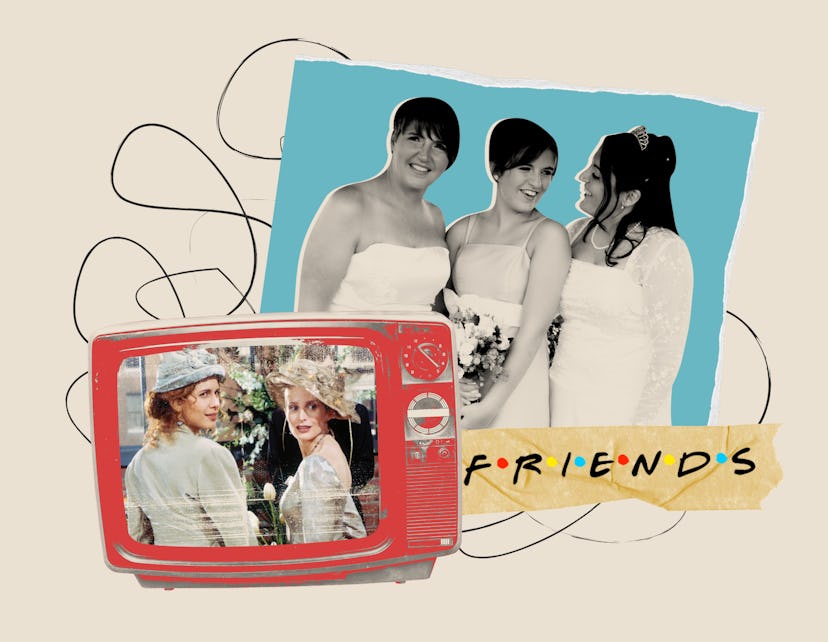TV & Movies
How Friends Fails Same Sex Families Like Mine
The portrayal of Carol & Susan’s relationships is laced with homophobia & ignores the joy that comes from growing up with two mums.

Everyone has their favourite iconic Friends moment, from “piiivvooott” to “I got off the plane.” But for me, it has always been Ben Geller’s birth in season one.
While his ex-wife Carol is in labour, Ross finds himself locked in a cupboard with her “lesbian life partner” Susan, arguing over who will have more parental claim to the child. Phoebe tells them that she barely had enough pieces of parents to make a whole one, but this baby isn't even born yet and already has people fighting over which one gets to love him the most. In her eyes, she says, he is the luckiest baby in the world.
That’s how I have felt my entire life – the luckiest daughter to two mums and a dad.
This show holds a special place in my heart that extends beyond the nostalgia of a barely nineties childhood. As someone who was raised by same-sex parents, Friends was the first and only time I’d ever seen a family that looked like mine on screen.
"As someone who was raised by same-sex parents, Friends was the first and only time I’d ever seen a family that looked like mine on screen."
Though they were supporting characters for most viewers, Carol, Susan, and Ben played a huge part in helping me navigate my life. I will always remember trying to explain us on a first date and being asked “So, are you like Ben from Friends?” I didn’t mind because, yes, I am.
However, although it has given me a very recognisable reference point, Friends is fundamentally flawed in how it portrays having LGBTQ parents. It’s no secret that the series hasn’t aged well at all. In recent years, it has (rightly) faced criticism for its complete lack of diversity, blatant misogyny, and fatphobic presentations, among other failings.
At the time, Friends was praised as progressive for even featuring a lesbian couple, let alone one with a child. However, Carol and Susan’s portrayal is laced with homophobia, from the way Ross is mocked for “turning” his wife gay to his discomfort at the fact his child being raised not just by someone else, but another woman.
"Throughout the series, Carol and Susan’s happiness is hinged on Ross’s feelings of emasculation."
In one particularly problematic episode, after finding Ben playing with a Barbie, Ross freaks out that his son might not grow up to be man enough. He unsuccessfully tries to dissuade him from the doll with “boys” toys like dinosaurs and army men, before accepting his failure at modelling masculinity.
Throughout the series, Carol and Susan’s happiness is hinged on Ross’s feelings of emasculation. They exist as antagonists for him; it is their love that prevents his perfect nuclear family and acts as the catalyst for a subsequent string of failed marriages.
Even Carol and Susan’s wedding episode (“The One With The Lesbian Wedding”) centres on Ross’s feelings of rejection over their joy.
Luckily, when I watched my mums marry in 2012, the rightful focus was on their love, and everything it had overcome and endured. And that’s exactly what this part of my life has always been: a celebration of our family and the love that exists within it. I have always actively rejected the assumption that being the child of same-sex parents is somehow drawing the short straw and something that would make me “unbalanced.” Growing up with an absence of traditional gender roles actually did the opposite, making me more tolerant and understanding.
"The reality is that I have a wonderful family who have been more than capable of raising me, regardless of their sexual orientation. Ben Geller had the same but, sadly, it was hardly shown."
I never really considered myself to have “lesbian” parents, just parents like everyone else. The reality is that I have a wonderful family who have been more than capable of raising me, regardless of their sexual orientation. Ben Geller had the same but, sadly, it was hardly shown. Instead, Friends peddled the idea that LGBTQ people’s ability to raise a family is inherently less than heterosexual couples, and in doing so it fails same-sex families like mine.
While it is tempting to argue some visibility is better than nothing, the Office of National Statistics reports that the number of same-sex couple families in the UK has grown by more than 50% since 2015. Families with two mums or dads are no longer anomalies or token storylines for shows to gain ‘woke’ points. These families are real, happy, and thriving. They deserve so much better than clinging to outdated and inaccurate portrayals of their lives.